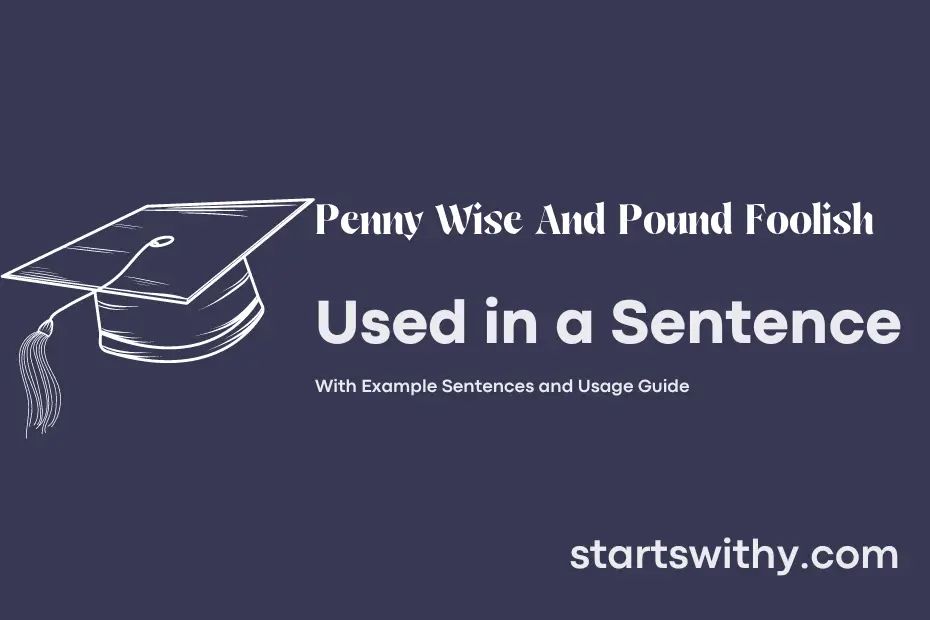Have you ever heard the saying “penny wise and pound foolish”? This idiom refers to someone who is careful or thrifty with small amounts of money but wasteful or extravagant with larger sums.
The phrase paints a picture of someone who pays close attention to saving pennies but overlooks the bigger picture, ultimately leading to financial losses.
7 Examples Of Penny Wise And Pound Foolish Used In a Sentence For Kids
- Penny wise and pound foolish means saving small money but wasting a lot.
- My grandma always says, “Be careful not to be penny wise and pound foolish.”
- Let’s be smart with our money and not be penny wise and pound foolish.
- Don’t forget the saying, “Penny wise and pound foolish” when making decisions.
- It’s important to understand the meaning of penny wise and pound foolish.
- Remember, being penny wise and pound foolish is not a good idea.
- Let’s all try to avoid being penny wise and pound foolish.
14 Sentences with Penny Wise And Pound Foolish Examples
- Penny wise and pound foolish, buying a cheap phone charger led to damaging my expensive phone.
- I learned the hard way that being penny wise and pound foolish by not investing in good study materials affected my grades.
- My friend’s penny wise and pound foolish decision to skip buying a student discount card ended up costing more in the long run.
- Trying to save money on transportation, he became penny wise and pound foolish when he missed an important exam due to unreliable public transport.
- Penny wise and pound foolish, she opted for a cheap hostel accommodation without proper security measures, which later resulted in theft of her belongings.
- His penny wise and pound foolish attitude towards healthcare led to neglecting medical check-ups and worsening his health condition.
- By choosing to eat unhealthy cheap fast food as a penny wise and pound foolish decision, he ended up spending more on medical bills later.
- Due to his penny wise and pound foolish behavior of procrastination, he faced academic penalties and had to pay for extension fees.
- As a penny wise and pound foolish move, he saved money by not buying the required textbooks and struggled with understanding the course material.
- Penny wise and pound foolish decisions of skipping career counseling sessions led to confusion about the right career path, resulting in wasted time and money.
- She realized that being penny wise and pound foolish by choosing inexpensive but poor-quality stationery hindered her productivity and studying experience.
- His habit of being penny wise and pound foolish by saving on printing costs with low-quality paper resulted in unprofessional-looking project submissions.
- The penny wise and pound foolish act of not enrolling in a skills development workshop cost him valuable opportunities in campus placements.
- Opting for a cheap internet connection without considering reliability turned out to be a penny wise and pound foolish decision, affecting his online classes and research work.
How To Use Penny Wise And Pound Foolish in Sentences?
To use the phrase “Penny Wise And Pound Foolish” in a sentence, you must understand its meaning and how to include it effectively in your writing or conversation. This phrase implies being frugal with small amounts of money while being wasteful with larger amounts. Here’s a beginner’s guide on how to incorporate this phrase into a sentence:
-
When writing, think about a scenario where someone is being careful with small expenses but makes careless decisions with significant investments. For example: “She saved money by buying cheap tools, but ended up spending more on repairs. She was being penny wise and pound foolish.”
-
In a conversation, you can use the phrase to caution someone against making shortsighted financial choices. For instance: “I know you want to save money by postponing necessary repairs, but be careful not to be penny wise and pound foolish in the long run.”
-
Remember, the key to effectively using this phrase is to contrast a prudent decision regarding small amounts of money with a reckless or wasteful choice involving larger sums.
By following these simple guidelines, you can confidently incorporate the phrase “Penny Wise And Pound Foolish” into your writing and conversations to convey a message about financial wisdom and the importance of considering long-term consequences.
Conclusion
In summary, the phrase “penny wise and pound foolish” encapsulates the concept of being frugal with small expenditures while overspending on large ones, ultimately leading to wastefulness and financial detriment. Examples like skimping on necessary maintenance to save a few dollars, only to face expensive repairs later, illustrate the shortsightedness of prioritizing immediate savings over long-term financial health. This mentality can prevent individuals and businesses from making wise investments that could yield greater returns or prevent costly consequences in the future.
Ultimately, being mindful of the broader financial impact of decisions and avoiding the trap of being penny wise and pound foolish is crucial for long-term financial stability and success. By judiciously balancing savings with investments in quality and preventative measures, individuals can avoid unnecessary expenses and ensure their resources are utilized efficiently and effectively.



